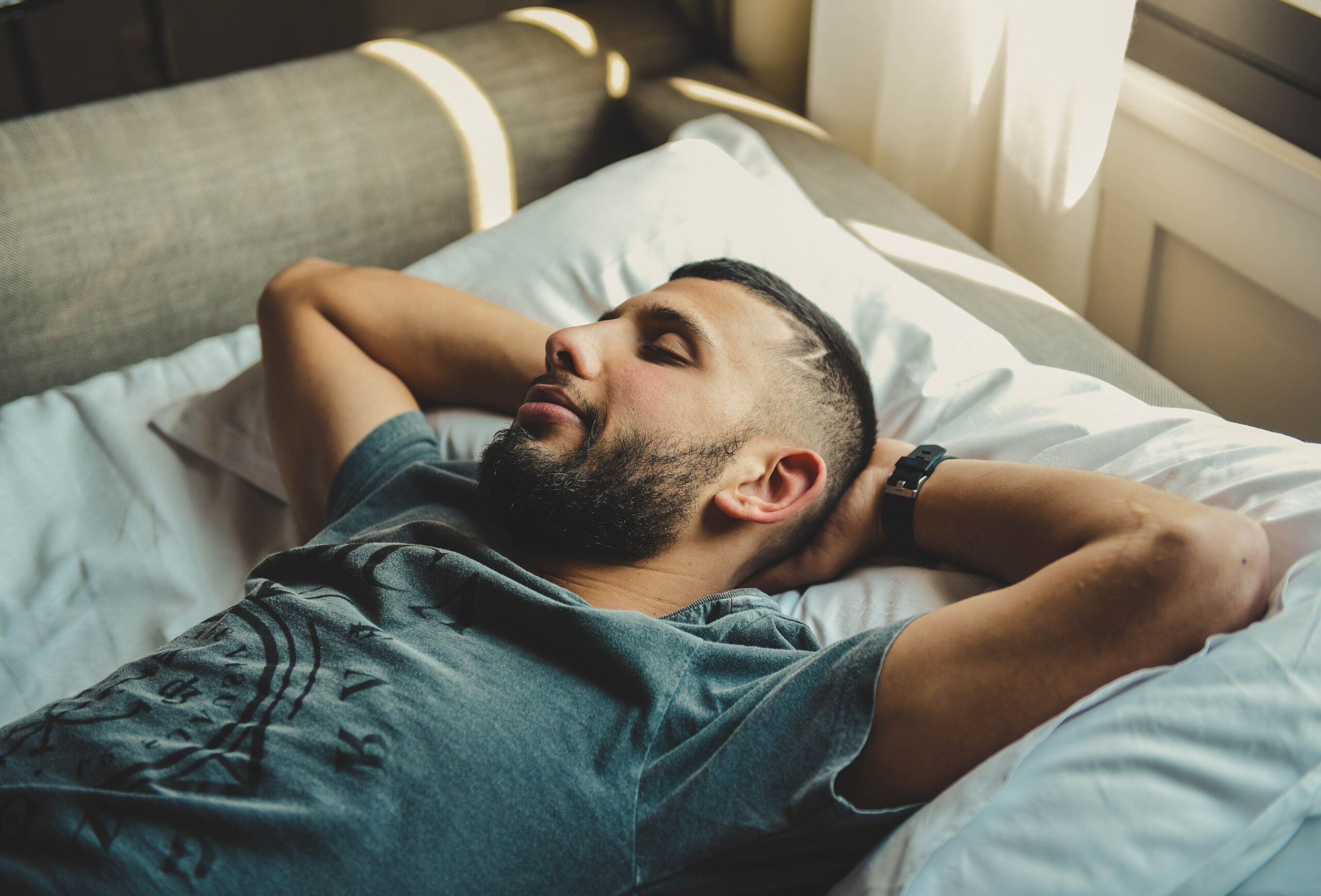Do you struggle to fall or stay asleep on a nightly basis? Does getting at least seven hours of sleep every night sound like a dream? Do you feel more tired than the previous night when you wake up in the morning? If your answer is yes, you’re probably not getting enough sleep.
However, you’re not alone. According to the Centers for Disease Control and Prevention (CDC), one out of three U.S. adults doesn’t get enough sleep.
By adopting healthy sleep habits, you can improve your sleep quality and have a more refreshing night’s rest. Here are ten tips for a better night’s sleep.
10 Ways to Improve Your Sleep
Hammer Down Your Sleep Routine
If you don’t currently have a sleep routine, it’s time to be intentional about creating one. Going to bed and waking up at the same time every day—weekdays and weekends—can help you become a better sleeper.
A 2017 study observed that regular sleepers had more nighttime sleep and slept less during the day compared to irregular sleepers.
Plus, irregular sleepers were more likely to fall asleep during the day, and wake up later than regular sleepers. Irregular sleeping can disrupt the circadian rhythm, the biological clock that regulates the sleep-wake cycle and other biological and behavioral processes.
Irregular sleepers also had delayed melatonin production, the hormone that tells your body to wind down for sleep.
The CDC recommends adults have at least seven hours of sleep a night. Set your sleep and wake times in a way that allows you to be in bed for at least seven hours.
Keep It Cool in the Bedroom
Sleeping in a cool bedroom is another way to improve your sleep quality.
According to experts, having a dark, quiet and cool bedroom gives you the ideal sleep environment. The CDC also recommends keeping your bedroom comfortably cool by setting the temperature to about 65 degrees Fahrenheit to 68 degrees Fahrenheit, along with using covers.
Save the Bedroom for Sleep and Sex Only
Ideally, your bedroom should be dedicated to two activities: Sleep and sex. Bringing any other activities into that space might affect your body’s response to your bedroom.
When you use your bedroom for activities that engage your mind, such as work, watching television, scrolling through social media and more, bedtime might begin to mean staying awake to do those other activities. You might have a more challenging time falling asleep when you want to because it feels natural to spend time in your bedroom doing things other than sleep.
You can start by restricting your bedroom for sleep and sex. If you’d like to do something else during bedtime, you can move to another room and return to your bedroom when you’re ready to sleep.
Create a ‘Pro Sleep’ Space
Make your bedroom a sleep haven so your body won’t have to work as hard to fall and stay asleep. If your bedroom is inviting for sleep, more than half of the work of having a pleasant night’s rest is done.
You can create a pro sleep space by keeping your bedroom tidy, cool, dark and quiet. You can create this environment by:
- Reorganizing your room to reduce clutter
- Using thick dark blinds so outside lights won’t penetrate your window
- Using earplugs and eye masks if you can’t keep your bedroom dark and quiet
- Using white noise devices to drown out outside noise
- Sleeping on a comfortable mattress and with snuggly pillows, bed sheets and covers
Limit Alcohol and Caffeine Consumption Before Bed
Many enjoy a cup of coffee to add some energy to their day or an alcoholic beverage to help them wind down at night. But, consuming either of these too close to bedtime can mess with your sleep.
Caffeine is a stimulant that keeps you alert. Taking it in the morning can be a boost for a productive day while consuming it at later hours could keep you up at night. Research shows that taking caffeine as early as six hours before bedtime can reduce your total sleep time by an hour, disturbing your sleep.
On the other hand, alcohol is sedating. So, while it might help you fall asleep, it can also reduce your sleep quality. It’s advisable not to use alcohol as a solution when you have trouble falling asleep—you might become dependent on it, which is tied to sleep problems.
If you enjoy alcohol or caffeine, you can limit your caffeine intake to morning times and have no more than two alcoholic drinks for men or one drink for women daily.
Say No to Late Night Snacking
Some people might feel the urge to snack at nighttime when they’re cuddled up watching a movie, but having a bite too late at night can affect your sleep quality.
Late-night snacking can make you prone to experiencing indigestion or heartburn that can disturb your sleep. Studies also suggest that people who eat or drink less than an hour before bedtime may struggle to fall asleep or get too much sleep.
Workout During the Daytime
If you’re looking for another reason to shuffle working out to the top of your daily to-do list, here’s one. Exercising, especially in the earlier hours of the day, can energize you during the day and help you sleep better at night.
Evidence suggests that exercise can help you fall asleep faster, remain asleep and sleep longer. The best part is the more quality sleep you get, the better your body can take on your workout routine.
Keep Napping to a Minimum
Napping is a great energy booster for the afternoon slump. If you’re looking to recharge, napping for 20 minutes or fewer works well. It can also improve your productivity and energy levels for the rest of the day.
But, when you nap too frequently, such as longer than 60 minutes or during the evening, it can make it harder to fall and remain asleep. You might wake up multiple times at night and experience poor sleep.
Try to limit napping to the middle of the day and for less than 60 minutes so that you can sleep better at night.
Get More Sunlight and Less Blue Light
Light can improve or lower your sleep quality depending on the time of the day you expose yourself to it.
Morning sunlight can help you feel alive and energized for your day. However, blue light exposure at night suppresses your body’s production of melatonin, which can make falling asleep at an appropriate time difficult. It can also contribute to or worsen sleep problems.
Experts recommend spending some time (the CDC suggests 30 minutes) under the sun in the first two hours after waking up to support your circadian rhythm. They also recommend not using blue or artificial light devices like your phones or laptop at least an hour before bedtime for a better night’s rest.
If you have to use blue light-emitting devices at night, you can get blue-light-blocking glasses to reduce how much blue light you expose yourself to.
Keep Calm and Meditate
Falling asleep can feel tedious when your body is tense, and your mind is all over the place. Before going to bed, try to do activities that relieve stress and any worries that might keep you up.
You can manage worries by journaling about your day and creating a to-do list for the next day. You can help your body feel calm and at ease by meditating. Studies suggest that using meditation apps (in this case, Calm) can also improve how well you sleep.

